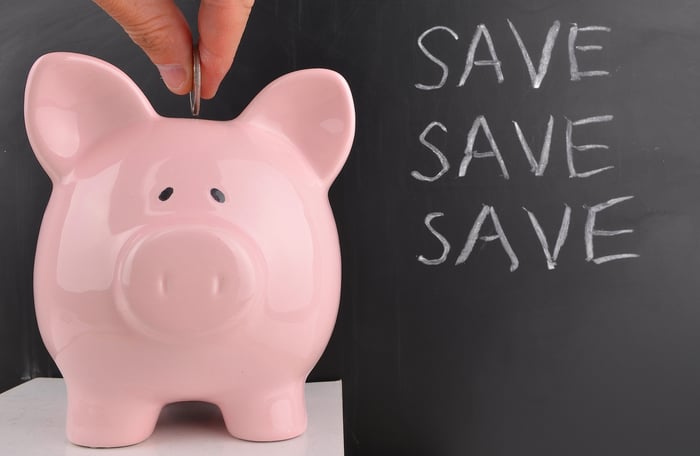We're constantly told to save for emergencies -- yet most Americans aren't doing a good enough job in that arena. In fact, according to new data from GOBankingRates, more than half of Americans have less than $1,000 in savings, and the bulk of U.S. adults don't have enough cash to cover an extended bout of unemployment or an unplanned medical bill.
If you're behind on emergency savings, then it's critical that you take steps to do better -- especially since you never know when an unanticipated expense will fall in your lap. How much money do you need socked away? It depends on your circumstances, but generally speaking, workers are advised to have enough cash on hand to cover three to six months of living expenses. Here's how to build up to that point if you're nowhere close at present.

IMAGE SOURCE: GETTY IMAGES.
1. Bank your raise
Did you get a raise at the start of 2018? Before you get too used to having that extra money in your paychecks, figure out how much of a boost you really got on a post-tax basis, and set up an automatic savings option that sends that excess directly into your bank account. The logic here is that since you didn't have that money available as of just a couple of months ago, there's no reason you can't go back to living without it. And if you automate your savings, you'll resist the urge to spend that newfound cash.
2. Rethink your budget
If you're already following a budget, you're ahead of the game compared to the bulk of Americans who aren't. Still, that doesn't mean your budget is best serving your financial needs. If you're looking to grow your savings, you'll need to reexamine that budget and find ways to cut corners. That could mean canceling your cable package, curbing leisure spending, or unloading a vehicle whose monthly payment could otherwise be padding your emergency fund. It doesn't really matter which expenses you trim as long as you take some steps to free up more cash for savings.
3. Get a side hustle
Those of us who hold down a day job know full well how draining that alone can be. But if you're frighteningly behind on savings, you may need to push yourself toward a side hustle, at least temporarily. Working a secondary gig is a great way to boost your savings quickly, and if you're willing to keep at it, you might manage to avoid cutting some of the expenses we just talked about.
4. Save your tax refund
Each year, the majority of tax filers wind up getting some sort of refund. If you're due money from the IRS, one of the smartest things you can do with it is stick it directly into the bank. This holds true whether you get a $600 check or a $6,000 one. Any amount you can add to your savings will go a long way when you're coming in far behind.
5. Clean house
Many of us are too busy to regularly take inventory at home, but if you do a quick look around, you'll probably realize you're sitting on multiple items you no longer need or use. If that's the case, then investing some time into selling those possessions could put a chunk of cash back in your pocket -- cash you can use to pad your savings. So go ahead and list that old TV or that designer outfit you bought a year ago that still has its tags. You never know how much someone might be willing to pay for an item that'll otherwise just collect dust or take up precious space in your closet.
Of course, these are just some of the options you have for boosting your emergency savings, so if you're sitting on minimal cash, you'll want to get moving one way or another. There's no telling when your car will break down, your roof will collapse, or your leg will get broken, and while you certainly can't predict the future, you can do your part to protect yourself from it financially.




